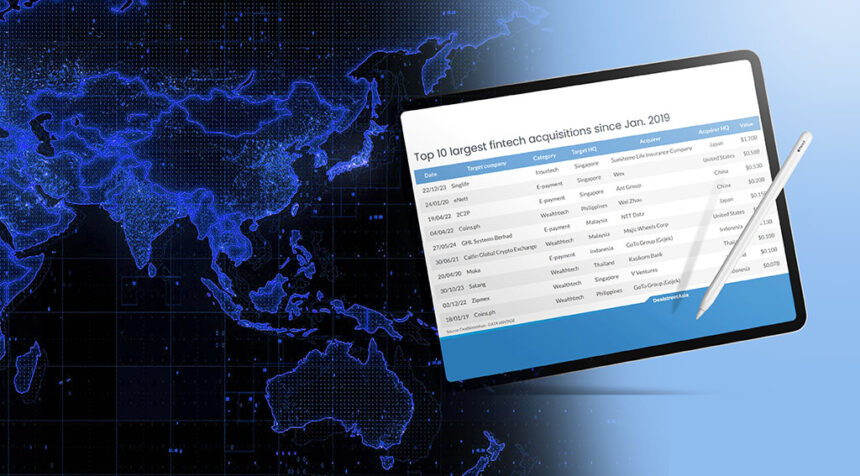Fintech maintained its position as the most active technology sector in mergers and acquisitions (M&A) activity across Southeast Asia in 2023, despite a significant year-on-year (y-o-y) decline.
This performance share The SE Asia Tech M&A Review June 2024 report by DealStreetAsia reflects the sector’s resilience and continued innovation.
The report, released in June 2024, highlights a sharp decline in M&A activity across the region in 2023. Although the number of fintech M&A deals declined significantly by 56%, the sector still topped the list as the best-performing technology industry with 15 deals. For that year. This puts fintech ahead of software and IT (14), marketing technology (12), human resources (HR) technology (8), e-commerce (7), and traditional financial services (7). was ranked.

Notable M&A deals in 2023 include: acquisition Sumitomo Life Insurance Company acquired insurtech company Singlife for US$1.2 billion. Another important transaction was that of Kasikornbank. purchase Cryptocurrency exchange Satang is valued at USD 100 million.

Tech M&A activities in Southeast Asia
In 2023, technology M&A activity across Southeast Asia experienced a significant downturn, with the total number of deals down 34% year-on-year to 114 deals.

This significant decline was primarily caused by a decline in domestic trade. The number of acquisitions by domestic companies decreased by 49% from the previous year to 40, which was significantly lower than the 22% decrease in the number of acquisitions by foreign companies. Domestic acquisitions will account for 35% of all high-tech M&A in 2023, the lowest share since at least 2018.
Singapore led the way in foreign acquisitions in 2022 with 32 deals, but in 2023 the number of deals dropped by an astonishing 84% to just five. The number of acquisitions in Singapore also decreased by 63% from the previous year to 14.
As a result, 74% of high-tech M&As (40 deals) in Singapore in 2023 were acquired by foreign companies, up from 52% in 2022.
The US completed 18 deals across the region in 2023, up from 16 the previous year, overtaking Singapore to emerge as the largest acquirer of foreign companies. China and the UK shared second place with seven deals each, followed by Japan with six deals.

Among major Southeast Asian countries, Indonesia saw the sharpest decline in high-tech M&A deals, with the number of deals dropping 51% year-on-year to 23 deals. This decline coincides with two consecutive years of sustained declines in venture funding of more than 60%.
Singapore, typically the largest contributor of high-tech M&A deals in the region, saw its number of deals fall by 33% to 54 in 2023. Malaysia, which had maintained a stable flow of transactions from 2020 to 2022, also experienced a decline in the number of transactions and a decline in the number of transactions. In 2023, it will decrease by 38% to 13.
Conversely, Vietnam is the only market in the region to see momentum in 2023, with total deal volume increasing to 7 deals from 5 in 2022.

Southeast Asia M&A trends in 2024
Southeast Asia saw a further decline in M&A activity in 2024, with total deal value of just USD 22 billion in the first half of the year, compared to USD 85 billion in all of 2023, down 34% year-on-year. According to said Elizabeth Lin, head of corporate finance and advisory at Singapore’s United Overseas Bank (UOB).
The number of transactions also fell significantly, from over 800 in 2023 to 300 in the first half of 2024.
However, as interest rates continue to decline, Lin predicts that M&A appetite will increase in the future. Additionally, the region’s economic growth rate is projected to rise from 4.2% in 2023 to 4.8% in 2024. This improved economic outlook is expected to reignite interest in M&A and create favorable conditions for deals across the region, he said.
Lin expects industries such as healthcare, infrastructure, telecommunications (including towers and data centers), and renewable energy to continue to drive M&A deals. Areas of focus include digital transformation, particularly artificial intelligence (AI) and other emerging technologies. Additionally, green technologies, driven by change and environmental, social and governance (ESG) considerations, are expected to drive the continuation of renewable energy.
Featured image credit: Edited from freepic







